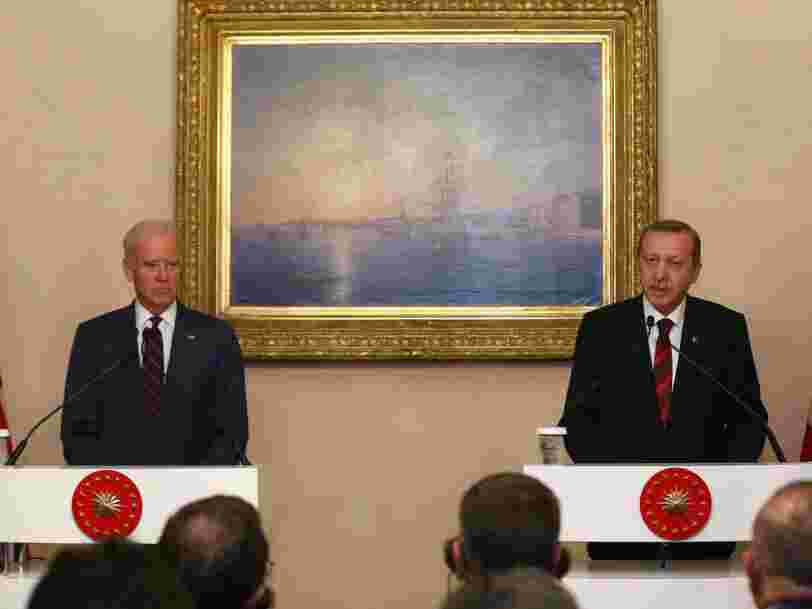Biden is set to officially recognize the Armenian genocide, despite warnings from Turkey it could 'worsen ties' even more
John Haltiwanger | Publié le | Mis à jour le
- Biden is set to formally recognize the Armenian Genocide on Saturday, the NYT reported.
- No US president has officially recognized the killing of 1.5 million Armenians during WWI as genocide.
- Turkey has warned that such a move would harm relations at a time when they're already strained.
- See more stories on Insider's business page .
President Joe Biden is poised to formally recognize the Armenian genocide on Saturday, The New York Times reported per officials familiar with deliberations on the matter, in a historic move that could further roil US-Turkey relations.
Turkey has urged Biden against recognizing the killings as genocide at a time when the dynamic between Washington and Ankara is already historically contentious. Speaking on the matter during an interview with the Turkish broadcaster Haberturk on Tuesday, Turkish Foreign Minister Mevlut Cavusoglu said, "Statements that have no legal binding will have no benefit, but they will harm ties."
"If the United States wants to worsen ties, the decision is theirs," Cavusoglu added.
The White House did not immediately respond to a request for comment from Insider.
Biden would be the first sitting US president to officially recognize the killing of 1.5 million Armenians by the Ottoman Empire during World War I as genocide. That said, former President Ronald Reagan made a reference to the "genocide of the Armenians" in a 1981 statement on the Holocaust. The step Biden is reportedly set to take would be more official and occur in concert with Armenian Genocide Remembrance Day, which happens every year on April 24.
Every president since Jimmy Carter has made public statements memorializing the atrocities committed against the Armenians during the first world war, but stopped short of referring to the killings as genocide. In a statement on the annual remembrance day last year, for example, then-President Donald Trump characterized the killings as "one of the worst mass atrocities of the 20th century."
Forty-nine US states and dozens of countries , including key US allies and fellow NATO members such as France, Germany, and Canada, have recognized the killings as genocide. In 2019, both the House and Senate passed resolutions designating the slaughter as genocide.
The mass slaughter, which began in April 1915, transpired as Turkey forced Armenians on a death march from the Eastern Anatolia Region to the Syrian Desert.
Turkey has dismissed any characterization of the massacre as "genocide," even as scholars and historians widely regard it as an indisputable fact. There are eyewitness accounts from survivors and reports of mass graves from diplomats who saw and documented the killings firsthand.
Raphael Lemkin, a lawyer of Polish-Jewish origin who lost much of his family during the Holocaust coined the term "genocide," studied the atrocities against the Armenians closely. In other words, the word "genocide" is fundamentally linked to what happened to the Armenians during World War I.
Despite the evidence and agreement among scholars, US presidents have consistently avoided calling the killings genocide over fear of angering Turkey - a country long regarded in Washington as a vital NATO ally (the US also has nuclear weapons stored in Turkey ).
Not long after his inauguration, Biden pledged that his foreign policy would be centered on human rights. Critics have said Biden is falling short on this promise on an array of issues, ranging from refugees to relations with Gulf States. But recognizing the Armenian genocide would signify that when it comes to US-Turkey relations, Biden is prioritizing human rights over keeping Ankara happy.
Tensions between the US and Turkey were already rising before Biden entered the White House, and this trend was expected to accelerate upon his arrival.
Turkish President Recep Tayyip Erdogan's authoritarian approach to leadership, on top of moves such as targeting the US-backed Kurds in Syria and purchasing the S-400 missile defense system from Russia, has strained ties between the two countries. Though Trump referred to Erdogan as a "friend," his administration in December hit Turkey with sanctions over the S-400 deal.
Along the campaign trail, Biden referred to Erdogan as an "autocrat," prompting condemnation from the Turkish government. More recently, Erdogan in March lashed out at Biden for referring to Russian President Vladimir Putin as a "killer," stating it was "truly unacceptable" and "not something that can be stomached."
Via PakApNews